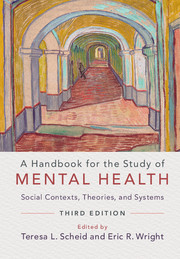Sociology of Mental Health
Sociology of Mental Health, 4th Edition offers a comprehensive introduction to the impact of social forces on mental health. Fully updated throughout, it features eleven new chapters on such topics as immigration, the work-family interface, and LGBTQ+ mental health. Part I addresses the central theoretical developments in the sociology of mental health. Part II examines the social context of mental health, including the social structures, statuses, and positions that affect mental health. Part III moves to the system level, focusing on the structural forces that shape mental health care. Each chapter is written by leading scholars who have defined our understanding of the relationship between mental health and society. This book is designed for mental health students, educators, researchers, and providers, serving as an essential resource for anyone seeking to understand mental health and mental health delivery systems.
- Provides broad theoretical frameworks for understanding mental health and illness, emphasizing the impact of social conditions and processes on mental distress and care access
- Highlights the role of social contexts in shaping psychological distress and psychiatric diagnoses, focusing on sources of stress and critical social issues like immigration, homelessness, and LGBTQ+ mental health
- Stresses the need for effective, responsive treatment systems that address the stigma of mental illness and cater to diverse populations
Product details
July 2025Hardback
9781009414944
528 pages
254 × 203 mm
Available
Table of Contents
- Foreword Allan V. Horwitz
- Preface Teresa L. Scheid and Eric R. Wright
- Part I. Theoretical Perspectives on Mental Health and Illness:
- 1. Sociological approaches to mental illness Peggy A. Thoits
- 2. Defining mental disorders Owen Whooley and Bianca Ruiz-Negrón
- 3. How should we assess mental health problems? Jason Schnittker
- 4. Socioeconomic stratification and mental disorder William W. Eaton and Carles Muntaner
- 5. Labeling and stigma as it applies to mental illness Bruce G. Link and Jo C. Phelan
- 6. Stigma resistance and mental illness identity: implications for theory and practice Kristen Marcussen
- 7. The sociology of suicide Jason Manning
- 8. Patterns, pathways, and correlates of care: classic and contemporary theories of utilization and findings Bernice A. Pescosolido and Elizabeth M. Anderson
- Part II. The Social Context of Mental Health and Illness:
- 9. Major findings and new directions in the study of social support and mental health Robyn Lewis Brown, Christy L. Erving and Maria Rockett
- 10. Gender and the pathways to mental health and illness Sarah Rosenfield, Dena T. Smith and Meleah Fekete
- 11. Black American women and mental well-being: the intersection of race, gender, and socioeconomic status Verna M. Keith and Diane R. Brown
- 12. Sexual and gender minority mental health Gabe H. Miller
- 13. Sociology and public health applied to preventing adolescent suicidal behavior Leigh Willis and Alexander Crosby
- 14. Mental health and the work-family interface Marisa Young and Ruth Repchuck
- 15. Accessed status and mental well-being in cross-cultural context: competing theories Lijun Song and Zhe Zhang
- Part III. Mental Health Systems and Policy:
- 16. Mental health care in the community Kerry Dobransky
- 17. Mental illness and the criminal justice system Virginia Aldige' Hiday and Brad Ray
- 18. Homelessness and mental illness Fred E. Markowitz
- 19. Immigration, culture and mental health Andrea G. Perez Poritillo, Juliann Li Verdugo and David T. Takeuchi
- 20. Mental health and the trauma of terrorism and extreme violence Robert J. Johnson, Olivia Yoh, Isabelle Beulaygue and Stevan E. Hobfoll
- 21. Stigma in global context: cultural myths and realities that shape research and social change Emily A. Ekl and Bernice A. Pescosolido
- Epilogue: critical reflection and future directions for sociological research Eric R. Wright and Teresa L. Scheid.









